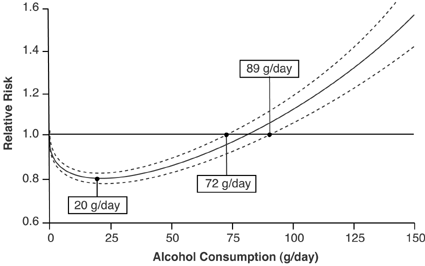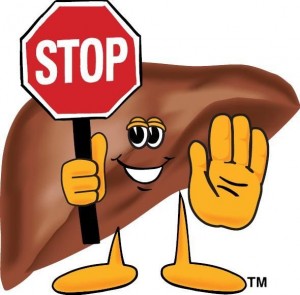History may suggest that the fermentation of fruit to make alcohol was only a 10,000 year-old practice, but recent evidence in the journal PNAS shows that we were able to metabolize it LONG before that.
The researchers discovered that the version of the ADH4 enzyme necessary to breakdown alcohol (Class IV alcohol dehydrogenases) was present in the gorilla and chimpanzee. Implying that we’ve been able to metabolize alcohol since we evolved from the ape over 10 millions years ago.
Which doesn’t mean we all need to drink! But does mean we can, and always have. Contrary to popular belief that we shouldn’t, because it’s not in our DNA.

The interesting takeaway from this new evidence, is that the researchers believe the increased ability to metabolize alcohol in the 10 million year old apes developed out of necessity – as food scarcity had them feeding off fallen fruits that were fermenting on the jungle floor, and the need to consume them without getting ‘too drunk to protect themselves’ grew in importance.
The ADH4 in 10-million year-old apes was 40 times more efficient at metabolizing alcohol than it’s 50-million year old counterpart.
And while we’re on the topic, another misconception surrounding alcohol is that it’s unhealthy, or that those who choose to avoid it are ‘healthier.’ When in fact, consuming fermented beverages is beneficial for your gut, certain alcoholic beverages (like wine) provide a considerable amount of antioxidants, and 1-2 glasses of alcohol per day is actually protective against disease and early death (1, 2, 3).

The reason health problems arise is because people consume too much alcohol at once, stay up far too late doing it, and add it to a liver that’s already overburdened with excess sugar. Leaving their bodies stressed, inflamed, and pumping out fat.
Conversely, consume a few drinks early in the night, follow it up with a meal high in protein, and head to bed at your regularly scheduled time, and it’s a different story. Especially, if you’re working with a carb-starved liver and avoiding fructose-filled food and beverages on a regular basis.
WHY?
Because a lower intake of carbohydrates means the liver isn’t having to convert excess glucose to fat, and can work on processing the alcohol. It also means there’s some available glycogen storage in the liver for whatever sugar happens to be included with the alcoholic beverage.
Keeping in mind, of course, that we also want to ensure that this ‘extra’ sugar is minimal – especially when it’s the fructose kind! Since just like alcohol, it heads straight to the liver for processing; and unlike glucose, it’s preferentially stored there.

Fortunately, fermented fruit beverages (like wine) have minimal amounts of sugar and fructose. And this is one of the reasons they’re on the ‘consume’ list (along with ‘hard alcohol’) if you’re looking to have the occasional drink.
The other reason wine is on the consume list is because it’s flat-out healthy. Providing extremely high amounts of antioxidants (1, 2, 3), reducing inflammation (1, 2), and supporting beneficial bacteria in the gut (1, 2, 3, 4, 5). Leading to lower rates of heart disease (1, 2, 3, 4), dementia (1, 2, 3), depression (1, 2, 3), metabolic dysfunction (1, 2, 3, 4), and even cancer (1, 2, 3).
(when consumed in moderation!)
Some say the lower risk may be attributed to the alcohol itself, but clearly the antioxidants are a contributing factor.
Other than wine drinkers being healthier in general (healthy-user bias), it seems to be the only explanation for wine’s superior health promoting benefits when compared to other alcoholic beverages (1, 2, 3, 4, 5).
Of these antioxidants, Resveratrol (found in the grape skins), appears to be the most well-studied. With researchers showing it’s effectiveness in:
- Reducing inflammation (1, 2, 3)
- Preventing free radical damage (1)
- Inhibiting cancer growth (1, 2, 3, 4, 5)
- Improving insulin sensitivity (1, 2, 3)
- Preventing Arterial Stiffness (1)
- Improving cognitive function (1)
- Inhibiting the growth of fat cells and preventing fat gain (1, 2, 3, 4)
- Increasing blood flow to brain and protecting against damage (1, 2)
- Keeping estrogen levels down (1)
- Reducing muscle damage and promoting repair (1, 2)
- Slowing the aging process (1, 2, 3)
And sure, these studies use much larger amounts of resveratrol than you could get (or would want to try getting) from wine. But even a little bit of resveratrol seems to go a long way – as red wine consistently performs better than white, and the differences are often seen in the cardioprotective department (where resveratrol-rich grape skins seem to have the biggest impact).
So if you have the choice, red wine is highly encouraged. Since it contains nearly ten times the polyphenols compared to white, and comes with that extra dose of resveratrol. But either way, the pulp of the grapes (used to make white wine) still appears to benefit the heart, and white wine is still high in antioxidants.

In all cases, the key is MODERATION. Since the heart boosting benefits of wine (raising HDL cholesterol, reducing LDL cholesterol, lowering blood pressure) appear to be maximized at 1-2 glasses per day. While higher dosages, of both wine and other alcohols, seem to have a negative impact on heart health (1, 2, 3, 4).
And similarly, you should treat your wine consumption like you would fruit, and match it to your activity level. Predominantly to ensure there’s room in storage for the 2-5g of glucose per glass, and increase the chances that it ends up as muscle glycogen instead of liver glycogen, but also because the elevations in HDL cholesterol and reductions in LDL are more pronounced in those pairing wine with exercise.

Interestingly, research from 2008 in the Nutrition Journal looked at a nutrition plan that was very similar to Live It NOT Diet! but included the regular consumption of wine (200-400mL/day) – calling it the ‘Spanish Ketogenic Diet.’ After testing 40 overweight subjects (BMI > 37) for 12 weeks, who consumed pre-study diet that was greater than 50% carbohydrates, these were the results:
- Weight-loss – 32lbs
- BMI reduction – 4.7kg/m2
- Blood pressure drop – 16.65 mmHg systolic, 9.28 mmHg diastolic
- Triglyceride reduction – 114.23 mg/dl
- Blood glucose decreased – 16.48 mg/dl
- LDL cholesterol drop – 8.43 mg/dl
- HDL cholesterol increase – 4.47mg/dl
Suggesting that wine isn’t going to harm your progress. And given the extra antioxidant and anti-inflammatory support for the heart, brain and gut, it will probably improve your overall health.

All I ask is that you:
- Treat it like fruit (reward for exercise)
- Consume it in moderation (<2mL per pound bodyweight)
- Favor ‘Reds’ from ‘Hot, Dry Climates’ when possible. (darker grape skin = more antioxidants)
- Look for ‘Organic’ and ‘Traditionally Made’ (less sulphites and arsenic, more resveratrol and antioxidants) – I use these guys (Dry Farm Wines)
If you’d rather feed your gut bacteria with other fermented foods, and get your dose of antioxidants elsewhere (berries, dark chocolate), that’s cool too. Alcohol isn’t for everyone, and there’s no pressure to start drinking it.
Stay Lean!
Coach Mike
RELATED ARTICLES:
Beyond Live It NOT Diet! - Repair Your Gut
Why Carbs Are Best Consumed AFTER Exercise
Fermented Foods - The Better (& Cheaper) Probiotic
From Chronic Inflammation to Chronic Disease - 10 Ways To Prevent It
